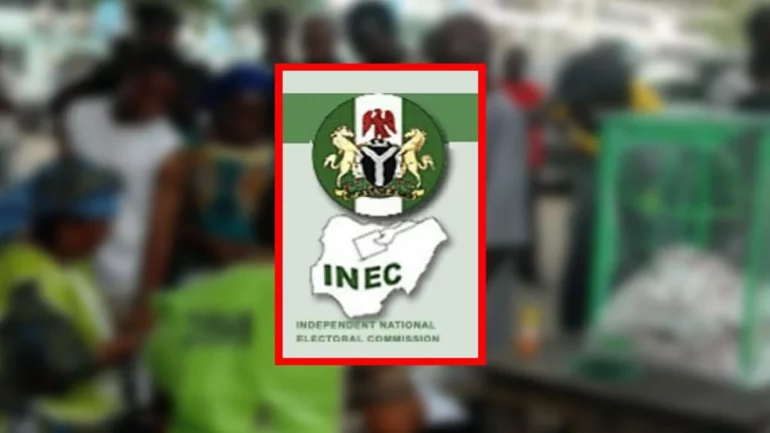The Chairman of the Independent National Electoral Commission (INEC), Prof. Joash Amupitan, SAN, has said that despite major gains recorded through the deployment of the Bimodal Voter Accreditation System (BVAS), weak telecommunications connectivity remains the Commission’s biggest obstacle to real-time results upload.
Speaking at the 2025 Digital Nigeria International Conference and Exhibition in Abuja organised by the National Information Technology Development Agency (NITDA)—the INEC Chairman, represented by National Commissioner May Agbamuche-Mbu, noted that uneven network coverage across the country continues to impede the seamless transmission of polling-unit results to the INEC Result Viewing (IReV) portal.
According to a statement issued on Tuesday by the Chairman’s Chief Press Secretary, Dayo Oketola, Amupitan explained that although voter impersonation and multiple voting have been largely eliminated, the Commission still faces significant connectivity gaps in several regions.
“With 176,846 polling units tucked into swamps, perched on mountains, and hidden in far-flung communities, achieving real-time upload of polling-unit results to the IReV portal remains one of the toughest battles for transparency on Election Day.
“A tool like BVAS is only as good as the network it relies on,” he said, adding that INEC will continue engaging the Nigerian Communications Commission and mobile network operators while exploring alternative technologies to bridge the connectivity divide.
Despite these challenges, Amupitan insisted that the introduction of BVAS has ended the longstanding problem of identity theft in Nigeria’s elections. Addressing an audience of tech innovators, policymakers, and civil society representatives, he declared that multiple voting and identity fraud “are over,” describing BVAS as a turning point in Nigeria’s democratic evolution and a “foolproof mechanism” for voter verification.
“The BVAS device has become our frontline defence against identity fraud, ensuring that only the rightful, eligible voter can be accredited at the polling unit. With biometric safeguards now in place, voter impersonation has been effectively eliminated from our electoral system,” he said.
Citing data from the recent Anambra governorship election, Amupitan disclosed that the 6,879 BVAS devices deployed delivered “highly commendable performance,” with more than 99 per cent of polling-unit results uploaded to IReV on election day.
“These outcomes confirm that BVAS and IReV are no longer experimental but entrenched components of Nigeria’s electoral architecture. The figures announced at polling units are the same figures visible to the public. Technology has safeguarded the vote,” he added.
Amupitan also observed that earlier electoral technologies lacked adequate legal backing, often leaving the Commission vulnerable in election tribunals. This changed with the passage of the Electoral Act 2022, which formally strengthened the use of technological devices in elections. He identified Section 47(2) as the key provision that elevated tools like BVAS from administrative conveniences to “statutorily protected pillars” of the electoral process.
“This legislative foundation ensures that our digital tools have both operational and legal legitimacy. It has strengthened public trust and enabled the Commission to innovate with confidence,” he said.
Sending a strong message to political actors, the INEC Chairman ruled out any return to manual election procedures, which he described as “vulnerable to human interference.”
“The gains we have recorded are too significant to reverse,” he stated, stressing that the Commission intends not only to retain BVAS and IReV but also to enhance them.
Reiterating that the once-common practice of “ghost voting” has been eradicated, he concluded: “Our mission is simple: to ensure that every eligible voter is accurately verified, every vote properly counted, and every result transparently shared. Technology has helped us secure these foundations of democracy.”
Nigeria’s shift toward technology-driven elections followed years of public concern over voter impersonation, ballot stuffing, and opaque collation processes. Before the Electoral Act 2022, devices such as the Smart Card Reader lacked explicit statutory recognition, creating inconsistencies in their acceptance during election disputes.
Sustained advocacy eventually led to reforms granting INEC clear legal authority to deploy digital accreditation and results-management systems. The Electoral Act 2022 marked a decisive turning point by formally recognising the use of technological devices for voter accreditation and the electronic transmission of results. Section 47(2) specifically mandates the use of a technological device prescribed by INEC—such as BVAS—as the primary means of verifying voters at polling units.
The Act also strengthened the legal basis for IReV by empowering INEC to publish polling-unit results electronically for public access.
Since its enactment, BVAS and IReV have become central to off-cycle governorship elections across the country. Observers report improvements in biometric verification and transparency, although challenges such as connectivity gaps in remote areas and occasional device malfunctions persist.
Despite these issues, INEC continues to defend the systems as essential safeguards against identity fraud and electoral manipulation, arguing that they represent a significant improvement over previous manual-only processes.


